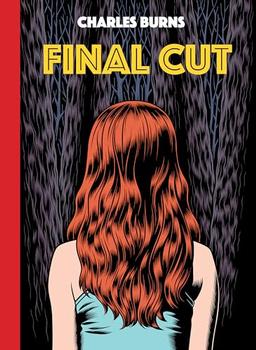Summary | Excerpt | Reviews | Beyond the Book | Read-Alikes | Genres & Themes | Author Bio

This article relates to Final Cut
 Movies are great escapism, and why shouldn't they be? An art form in its own right, rich in imagery and metaphor, the cinema offers many lessons that can be learned about ourselves and others just by watching someone else's drama play out on screen.
Movies are great escapism, and why shouldn't they be? An art form in its own right, rich in imagery and metaphor, the cinema offers many lessons that can be learned about ourselves and others just by watching someone else's drama play out on screen.
But while movies can be healing in the right circumstances, and have been proven to aid in "therapeutic exploration," they can also take our imaginations captive and warp our perceptions of reality. Cinema can act as a mirror to real life, reflecting popular societal trends for entertainment value. And since films portray characters with attributes similar to our own, it's far too easy to imagine oneself as the star of the show. When romanticized movies become the basis and measure for reality, expectations can end up skewed. In Charles Burns' graphic novel Final Cut, we see how far imagination can take us if we lose the distinctions between fiction and real life through the main character's fantasies about a girl who doesn't return his affections.
In a paper published by the University of New Hampshire Scholars' Repository in 2023, case studies were gathered going back to the earliest days of filmmaking, showing the discordance between romantic ideals as they appear on screen and actual life:
"American sociologist Herbert Blumer interviewed high school and college aged students in search of finding out how they were affected by the popularization of movies and the content of the movies they were exposed to. Inaccurate depictions of what an ideal life was supposed to look like was a common theme in movies watched by the students studied. A student expressed how he was 'eager to see such pictures as would teach me better and more effective methods of love-making and I often wished that the object of my devotion and admiration at the particular time could acquire the same feeling as the movies stirred within me' (Blumer 1933)."
The paper goes on to say, "There was sufficient evidence to conclude that young adults have felt less satisfaction with their intimate partner relationships in comparison to what they see in the movies."
Fantasy burns bright in the hearts of the young, but as we age it begins to fade, shaded with the harsh truths of adulthood. Adolescents on the cusp of maturity seem to be most susceptible to the lure of a glamorized version of their lives represented through film, where fate is prevalent, soul mates are real, everything is certain, and it all turns out alright in the end.
In Final Cut, Brian would rather envision a romanticized ideal instead of facing reality, much like the young individuals noted in the studies. He becomes obsessed with Peter Bogdanovich's 1971 film The Last Picture Show, a prime example of a melodrama, featuring situations so heightened in emotion they can't possibly be replicated in real life. Compare this to more recent examples such as the John Hughes films of the '80s, the 2004 romance The Notebook, or the Twilight franchise (2008-2012). For fans, the characters from these movies act as models for real aspirations, creating a line of wishful thinking that is impossible to live up to in their everyday lives, for both themselves and their envisioned partners.
So while films offer a welcome escape from the daily grind and the pressures it brings, we must be careful to recognize the differences in written characters versus flesh and blood, for only one can impact our very real futures.
Silhouette of Woman and Man Kissing, courtesy of cottonbro studio via Pexels
Filed under Cultural Curiosities
![]() This article relates to Final Cut.
It first ran in the October 2, 2024
issue of BookBrowse Recommends.
This article relates to Final Cut.
It first ran in the October 2, 2024
issue of BookBrowse Recommends.
Your guide toexceptional books
BookBrowse seeks out and recommends the best in contemporary fiction and nonfiction—books that not only engage and entertain but also deepen our understanding of ourselves and the world around us.